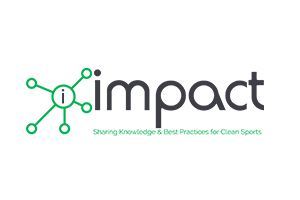What is Project IMPACT?
Project IMPACT enables the synergies between sport stakeholders (athletes and their entourage), expert academics, policy-makers and educators involved in the provision of clean sport education.
IMPACT aims to:
- Develop the first communities of practice for clean sport education in Europe.
- Enable synergies among key sport stakeholders, athletes, anti-doping organizations, researchers and education providers.
- Increase awareness about the benefits of using communities of practice for clean sport education and for stimulating future innovative anti-doping education practices.
Communities of Practice are “…groups of people who share a common set of problems, or a passion about a topic, and deepen their knowledge and expertise in this area by interacting on an ongoing basis” (Wenger et al., 2002).
IMPACT’s Communities of Practice will facilitate knowledge transfer among relevant sport stakeholders about existing and emerging challenges in clean sport education, including (but not limited to):
- Designing, implementing and evaluating the effectiveness of anti-doping education campaigns
- The role of nutritional supplements in doping use
- Inadvertent doping
- Understanding the experience and role of athlete support personnel in doping prevention
- Perceived legitimacy of anti-doping policies by athletes and their entourage
- Whistleblowing against doping misconduct
- The role of sponsors in doping prevention
- Monitoring and controlling doping behaviour in recreational sport settings
Who can benefit from IMPACT and why?
IMPACT’s beneficiaries include:
- Coaches
- Athletes and supporting personnel
- Educators
- Physical education specialists
- Personal trainers
- Academics and students in related disciplines
- Policy-makers
By participating in project IMPACT sport stakeholders will benefit by:
- Gaining access to an international, open-access and web-based repository of evidence-based anti-doping education resources available in different countries and languages.
- Belonging to a large, international network of communities of practice for clean sport education.
- Sharing knowledge and best practices in doping prevention with different stakeholders and practitioners from across the globe.
- Learning how to develop, monitor and evaluate the outcomes of communities of practice for clean sport education.


